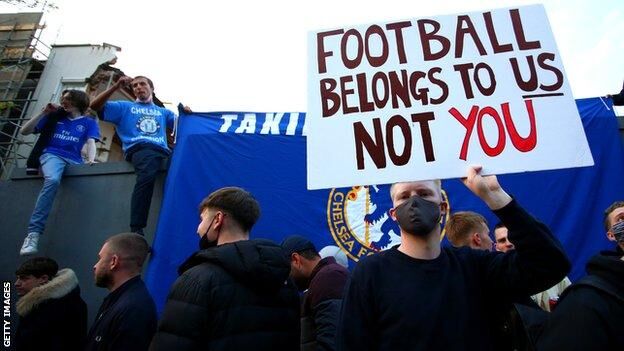The Horrible Prospect of the European Super League
Chelsea fans protest Premier League match.
April 28, 2021
To those of us who love the beautiful game of soccer, the formation of a Super League in European football was a horrible prospect. The stated motivation was to improve the quality of the game. The actual motivation was money and power, interchangeable goals that were not well hidden.
At its inception, the management of the top-level European teams met privately to discuss ways to ensure that those at the top stay at the top in terms of earning potential and exposure. Following the American model of leagues that are set without opportunity to be relegated to a less prestigious division, it sounded good at first. Why should any team, such as Manchester United, be relegated and not share the purse in a given year or short term period simply because they are slumping? After all, the team helped bring the sport its huge popularity.
The fans and players went nuts on many levels. By adding another league, the players who are already overplayed would be expected to add more games and practices into their lives. This is in addition to the travel involved. The fans love their hometown teams, and although the big names like Juventus, Chelsea, Barcelona, Bayern Munich and Paris Saint-Germain would continue to get the biggest following, they liked the idea that a team like West Ham could be in the playoffs. Every person can play soccer –– it’s part of the culture, and to take the dream of glory away was simply abhorrent.
UEFA president, Aleksander Ceferin, was infuriated. He checked in with several teams and was simply lied to about their intentions with regard to a Super League. In some cases, these individuals were more than colleagues but close personal friends. He had already worked hard to improve the regulations governing the Champions League to accommodate some of the concerns shared by the group wanting the Super League. In fact, UEFA instituted many new regulations to address some of the concerns that motivated the forces behind the Super League.
The reality would have essentially created a parallel Champions League with less competition but more games.
One journalist equated the formation of the Super League to the NBA. Imagine if the best teams didn’t like the outcome of the playoff system and decided that they would have their own playoffs to determine the true best team in basketball. They would play at the same time, so the greatest players would be expected to play in the “greatest game.”
Ceferin’s response was quick and sure. He announced that players should not be released from their current responsibilities on any level to play in the Super League. Many team managers agreed and levied their ownership to remove themselves from the conversation.
It happened…the Super League fell apart before it was even formed. However, the consensus is that it will be back. As leadership and the economy change, this issue will rear its ugly head again.
There is a phrase in soccer, to those of us who truly love it: “For the good of the game.”
There is no positive context in which a Super League would accomplish this. Still, money and power are huge motivators and will always work to increase their force. As fans, we hold the ultimate control because we buy the tickets. Refuse to support this attempt to sterilize the game and remove the hope and joy of loving teams that, at least for today, can realize the dream of being elite. Isn’t that what we all want?


